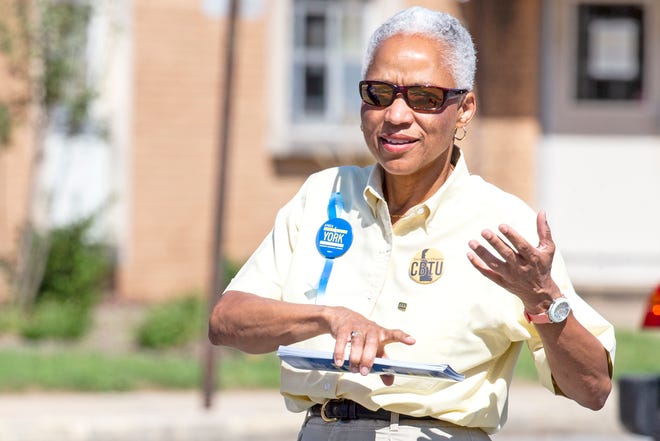A vast majority of progressive candidates won their primaries on Tuesday, apparently showing that Democratic voters are still seeking more liberal newcomers over established, longtime politicians.
The state’s Working Families Party, which backed several progressives, has become a significant player in Delaware elections, as at least three of its candidates won their races, particularly the open primaries.
Sophie Phillips, an environmental justice advocate won in District 18; Cyndie Romer, a tech worker and education activist, won in District 25 and Kerri Evelyn Harris, a veteran, won in District 32.
As in 2020, these candidates, who are likely to win their general election races in November, could help further push progressive policy in Legislative Hall.
“A lot of times incumbents will just sit on their hands and wait until the very end, which is why I think a lot of them keep losing,” said Karl Stromberg, organizer for the Delaware Working Families Party.
DE POLITICSLydia York defeats embattled McGuiness in Democratic auditor primary
Some 2022 primary races involving progressive candidates are still very close, as of Wednesday afternoon. DeShanna Neal had a 24-vote lead over House Majority Whip Larry Mitchell, leading to likely one of the biggest upsets. It will also alter the dynamic of House leadership.
Wilmington councilwoman Shané Darby, who entered the race late this summer, is trailing Rep. Nnamdi Chukwuocha by 90 votes, which Stromberg described as “remarkable” given the little time she had to campaign and fund raise.
With Districts 13 and 1 so close, it’s unclear if any recounts will happen. Officials for the Department of Elections did not return phone calls and emails Wednesday.
Yet some incumbents did hold strong: Progressive candidate Becca Cotto lost to Rep. Deb Heffernan, who represents the Bellefonte area, by about a 10-point margin.
In 2020, the Working Families Party contributed to the significant progressive wave of legislative candidates, many of whom were political unknowns, which ruffled dynamics in the General Assembly.
Two of these candidates were Reps. Eric Morrison and Madinah Wilson-Anton, who each won their primaries on Tuesday with 30-point margins.
Paul Brewer, a University of Delaware political science professor, said the impact of these primary wins has allowed progressives to increase “their capacity to push for more progressive policy outcomes at the state level.”
The progressive wave of 2020 had a clear impact on the most recent legislative session, with the passage of sweeping gun reform, paid parental leave and increased minimum wage. Lawmakers also got the closest they ever have to legalizing recreational marijuana, though were defeated by Gov. John Carney’s veto.
The primary also offered a clear warning sign to longtime lawmakers, Brewer said. In addition to Mitchell trailing in his race, Sen. Colin Bonini, a Dover conservative, lost his primary race after serving nearly 30 years.
“Historically, incumbents tend to do very well but incumbents don’t seem very safe the last couple cycles,” Brewer said.
The highest-profile race of Tuesday night was the Democratic auditor’s race, which was also the only statewide primary. Kathy McGuiness, the incumbent who had lost the support of many in her party following her misconduct convictions, was trounced by newcomer Lydia York.
The latest polling data showed York winning more than 71% of the vote. McGuiness did not win a single district.
PRIMARY DAYDelaware primary: Legislative races too close to call, low turnout, major upsets
“I think a lot of voters today wanted to make it clear that misfeasance in office should not be rewarded,” York said Tuesday night, shortly after she was declared the winner.
Because political polling is nearly nonexistent in Delaware, it was unclear how much support McGuiness had among voters, and if residents had been following the news of her conviction. Brewer, the UD professor, described the auditor as a “pretty low profile office, that’s probably not well understood.”
It explains why voter turnout was so low, Brewer said. Though turnout is often always higher in presidential election years, Delaware didn’t have any congressional or higher profile statewide races this year to draw voters.
“It’s hard to imagine York winning more decisively than she did,” Brewer said. “She crushed the incumbent. There’s no way around that.”

There are still questions about what McGuiness’ political future holds: In the weeks leading up to the election, leaders of the Democratic Party wanted her removed from office, saying that they no longer have confidence she can perform in this role.
Gov. John Carney, citing powers outlined in the state Constitution, has said he can only take action after a conviction is made official. McGuiness has yet to be sentenced.
One of the most competitive primaries in Delaware was in the 14th District, in which five Democrats ran to try and win Sen. Bruce Ennis’ seat. The longtime Smyrna lawmaker is stepping down, and he was often seen as one of the more conservatives Democrats in Legislative Hall.
Kyra Hoffner won the five-way race with 34.37% percent of the vote. She previously ran in the Democratic primary for the 14th District against Ennis in 2018.
Hoffner, who was not affiliated with the Working Families Party, has served as a lobbyist with the League of Women Voters, working on the redistricting maps for the legislative districts after the 2020 Census. She’s also helped the Delaware Cannabis Advocacy Network push to legalize recreational marijuana.
“A lot of people, especially seniors, feel forgotten,” Hoffner said. “There are a lot of issues that will greatly affect our seniors – the price of food, inflation, rents are higher, questions about Medicare Advantage.”
Ben Mace contributed reporting to this article.